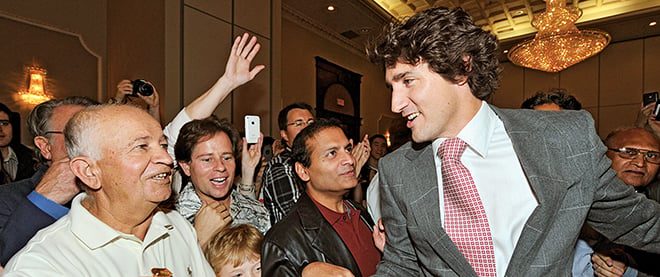How Trudeau can avoid getting stuck in the middle
From the editors
Mike Cassese/Reuters
Share

Attention, middle-class voters: Justin Trudeau is thinking about you. A lot.
“I say this to the millions upon millions of middle-class Canadians and the millions more who work hard every day to join the middle class,” Trudeau said as he accepted the leadership of the federal Liberal party this past weekend in Ottawa, following a landslide victory. “Under my leadership, the purpose of the Liberal party will be you.”
He added for good measure: “I promise that I will spend every day, from beginning to end, thinking about and working hard to solve your problems.”
Whether this promise of round-the-clock contemplation should properly be considered smart politics or outright stalking, Trudeau’s middle-class fixation ought to be seen as a canny attempt to define his political persona before his opponents get there first. He’s not an aloof philosopher king in the image of his father. Neither does he wish to be seen as a flaky upper-class dilettante, as Tory attack ads have already argued. Associating himself so tightly with the middle class paints a comfortable and appealing image for the telegenic new Liberal leader.
Of course, he’s hardly the first politician to discover the middle ground. Stephen Harper’s Conservatives have also spent a lot of time thinking about the middle class. So much so that Canadians now have good reason to be suspicious of policies that focus exclusively on those favoured folks in the middle.
With tax season upon us, the damage done to the tax code by Harper’s political fixation on the middle class should be painfully obvious to all. There’s now a tax credit for every alleged middle-class pursuit and avocation: volunteer firefighting, children’s art lessons and sports fees, students’ textbooks, small-business hiring and even long-haul truckers who dine out. A Tory booklet recently sent to voters boasts more than 30 individual tax credits, most meant to buy middle-class fidelity.
(Given such a comprehensive list, we shudder at what else could appear in the run-up to the next election in 2015; perhaps a barbecue tax credit to encourage more outdoor family time? Or a room-tidying tax credit for messy teens?)
All this may seem a boon to intended recipients, but the end result is an excessively complicated and inefficient tax system. Tax credits actually do very little to promote their intended consequences; the children’s-fitness tax credit plays no appreciable role in convincing parents to sign up their kids for sports. Rather, it functions as a financial reward to well-off parents who would have registered their offspring for hockey or dance lessons regardless.
Empty symbolism in the name of the middle class offers no practical benefit to Canada as a whole.
So is Trudeau’s commitment to the middle class cut from the same cloth? The thinness of his policy book makes this a difficult call. There are, however, a few points of interest. To his credit, he supported the takeover of oil and gas firm Nexen by the China National Offshore Oil Company, as well as the Keystone XL pipeline, on the grounds they protect middle-class jobs. Both policies thus represent the happy confluence of middle-class attention and economic good sense. Where Trudeau appears to veer closer to Harper-style middle-class pandering is in his promise to grandly boost access to post-secondary education; it’s worth a closer look.
The new Liberal leader has promised to raise Canada’s post-secondary “participation rate from just over 50 per cent to 70 per cent.” However, according to the most recent statistics from the Organisation for Economic Co-operation and Development (OECD), our 51 per cent attainment rate for post-secondary education among adults aged 25 to 64 is the highest among all 34 OECD countries. Our next-closest competitor is Israel, at 46 per cent. We’re already tops among our peers.
Further, research repeatedly shows no reliable link between family income and the decision to attend university or college. According to a study published by the school of policy studies at Queen’s University, the greatest obstacles to a post-secondary education are: single-parent families, poorly educated parents, the potential student’s hyperactivity and aggressiveness and his or her poor math and reading skills. While higher education is often painted as a middle-class concern, none of these actual barriers is linked exclusively to this group. Attempts to turn it into one, as Ontario has done with its foolish 30 per cent tuition rebate for middle-class families, simply produce bad policy.
As much as the middle class no doubt appreciates all the attention, class-based myopia distracts from sound, evidence-based policies. Whatever image Trudeau wishes to choose for himself, if he’s serious about becoming a unifying force for both the Liberal party and Canada as a whole—as he stressed several times during his acceptance speech—he’ll need to broaden his interests beyond the middle.